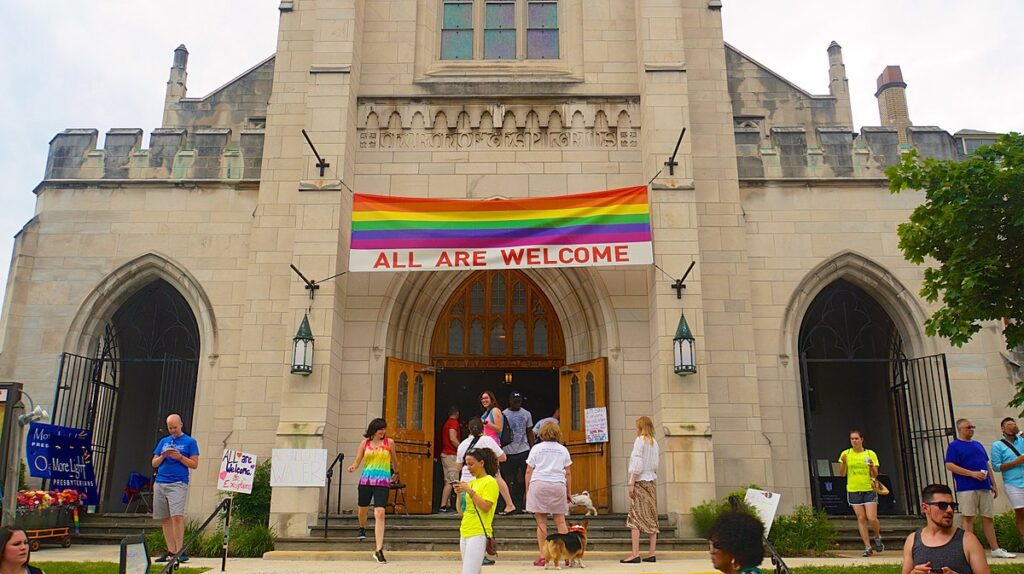How Catholics Can Win Against Heresy in Germany

In less than a month, hierarchs from several countries publicly reprimanded the German Bishops’ Conference for the heresy of the Synodal Way. A peculiar offensive of orthodoxy was initiated by Archbishop Stanisław Gądecki. Such actions need better preparations.
Paweł Chmielewski
For those who are not familiar, the Synodal Way of the Church in Germany can be briefly summarized as follows: The Synodal Way started in December 2019. The Church in Germany wants to vote on abolishing celibacy, instituting women’s priesthood, democratizing church authority, and legalizing homosexuality and contraception. The Pope has so far not reacted to these plans. Cardinals and bishops from several countries around the world did.
The president of the Polish Bishops’ Conference, Archbishop Stanisław Gądecki, was the first to do it on February 22nd. He sent a letter to his counterpart from Germany – Bp. Georg Bätzing. He drew attention to the erroneous perspective adopted by the German reformist process. The Polish hierarch referred both to the Holy Scriptures and to many documents of the Holy See. Finally, he summoned Bishop Bätzing to maintain loyalty to the Gospel.
On March 3rd, retired curial cardinal Walter Brandmüller published an article on the Austrian portal Kath.net, under the meaningful title, “Quo vadis, Germania?”. He accused the Catholic Church in Germany of succumbing to the erroneously assessed philosophy of Hegel and accepting the heretical neo-modernist ideology. According to the Cardinal, the Synodal Way leads directly to the “atheization” of Christianity.
On March 9th, bishops from northern Europe spoke about the same issue. The Scandinavian Bishops’ Conference sent a letter to Bishop Bätzing, in which it repeated the arguments of Archbishop Gądecki, warning the German hierarch against replacing the Gospel with the spirit of the times.
Finally, on March 15th, the former prefect of the Vatican Secretariat for Economics, Card. George Pell – the same one who spent over a year in an Australian prison based on false accusations of sexual abuse and later exonerated – called on the Holy See to formally intervene in the case of two German-speaking hierarchs, Bishop Bätzing and Card. Jean-Claude Hollerich from Luxembourg, following their statements on homosexuality.
Meaning of the Synodal Way
This unprecedented wave of criticism is related to the growing importance of the Synodal Way in the world. After all, a global synodal process is underway: already this year, hierarchs from all over Europe will have to come together and work out a common vision of the future. Germany offers a ready-made revolutionary package. They believe that their proposals fit perfectly with the issues outlined in initiating the synodal process of the Vatican Synod Secretariat. It is about the crisis caused by sexual abuse and contemporary social changes. Pope Francis has good relations with Germany, and many of his personnel decisions indicate that he wants to strengthen their position. Such hierarchs as Archbishop Gądecki understand how great the threat is: German errors can spread through the synodal process all over the world, the more so because, liberals in Germany think in very similar terms to those in many other countries.
Modernism Thus Far Undefeated
In this difficult and potentially very dangerous situation, every vote of opposition brings double the joy. The problem is that although the statements of Archbishop Stanisław Gądecki, the Scandinavian Episcopate and Cardinals Brandmüller and Pell are very important and valuable, they are deeply insufficient. None of them made an advanced and complex attempt to address the German errors. Without this, there is no question of permanently rendering the Synodal Way ineffective, which was also pointed out by Cardinal Brandmüller. In his article, he admitted that during the twentieth century, popes never made an effort to thoroughly criticize modernist errors; as a result, these errors could spread further, the effects of which can be witnessed today.
The cardinal is right: the situation is actually getting worse year by year. I am, of course, full of gratitude to Blessed Pius IX and St. Pius X for their writings against modernism; in retrospect, however, it must be said that they turned out to be too general and simple to face the challenge. Modernist ideology was already a refined ideology at that time; today it is so to an even greater extent, making use of modern sciences, such as psychology and sociology, in extremely broad ways. It requires a serious response that will not shy away from a top-level theological discussion.
Letter of Bishop Bätzing
Interestingly, this is what the protagonist of the Synodal Way, Bishop Georg Bätzing, invites to do. The German Bishops’ Conference announced that on March 16th, he had sent a letter of response to Archbishop Gądecki. The text of the reply has not been published in full. At least two important themes emerge from the discussion prepared by the media of the Episcopate.
First, Bätzing encouraged Archbishop Gądecki to read the texts adopted at the last Synodal Assembly and invited him in this context to a theological dialogue. The German is aware of his advantage in this respect: beyond Germany, theological foundations for a new understanding of sexuality, priesthood, and the role of women were being prepared for years. Germany has an enormous number of professional publications that try to justify the postulate to revise church teaching. One can, of course, simply declare it heresy and call for fidelity to the Gospel, as the aforementioned bishop and cardinals did in fact – rightly and justly. The point, however, is that the mere quotations from the Holy Scriptures or a somewhat mechanical reference to several documents of the Magisterium not only cannot convince anyone, but also cannot even effectively defend the truth. What is still needed is a systematic and thorough reflection on the problems posed by the adversary.
The need for theological effort
For example, in the “Orientation Text” adopted at the last Synodal Assembly, Germany lists six loci theologici, sources of theology, that is, places from which we derive our knowledge of God. They point to three traditional places, i.e. the Holy Scriptures, the living Tradition, and the Magisterium. However, they propose three more new ones: the signs of the times, the faith of believers, and the theological science.
This particular idea of the Germans is of great importance because it justifies the “opening” of the Church to completely innovative ideas. In my opinion, a good theologian would have no difficulty in showing that the German catalog of loci theologici is wrong and should, in fact, be narrowed back down to three traditional categories. In his letter, Archbishop Gądecki referred to these matters very briefly; it would be good if he could point to extensive work by specific authors.
It is similar in other matters. For instance, Archbishop Gądecki rejected the postulate of the Synodal Way regarding the ordination of women. However, he used only a few, very general arguments, the most prominent of which is the reference to the teaching authority of St. John Paul II. Again, this is not enough. It is necessary to prepare an extensive, fundamental response that defends the gender relationship of ordination, but taking into account the contemporary social context.
Trust crisis
The second issue is the credibility of the Church. In his letter, the chairman of the German Bishops’ Conference drew the attention of Archbishop Gądecki to the fact that the Synodal Way aims to be a response to the crisis of sexual abuse. This is only part of the truth, because the basic ideas of the Way are modernist, so they come from the times when no one has heard about abuses yet; in fact, however, in today’s context, German synodality is effectively presented as a remedy for the moral crisis of the Church.
Bishop Bätzing asked Archbishop Gądecki about his own proposals to overcome this crisis. This is a very accurate question: What do we want to do when the Catholic hierarchy is discredited because of the problem of pedophilia? I have the impression that the Church in Poland does not want to do anything, convinced that the crisis should be waited out. I am not ruling out that this is the right strategy, because the problem of abuse, as is well known, has largely non-church causes. In any case, such a strategy must be officially presented and substantiated. You can’t criticize the Germans if you don’t have a counter-proposal. The same is true of criticism by the Scandinavians or by Cardinals Brandmüller and Pell.
Effectiveness
Revolutionaries want to change the Church in a way that is contrary to the Gospel. However, their tools are so sophisticated that merely knowing that we are right is not enough. Catholic theology has taken a huge step towards a better understanding of God’s reality by fighting various heresies throughout history. Today we are facing perhaps one of the toughest opponents in history. Confrontation requires proper preparation.
I hope that the offensive initiated by Archbishop Gądecki with his letter of February 22nd will turn out to be only the first step in this battle, and that it will be followed by the systematic work of orthodox theologians who will thoroughly show the errors of the Synodal Way and propose solutions to contemporary problems in accordance with the Gospel. Without it, we will only convince the convinced. This is not enough: we must defend Christ’s faith not only bravely but also effectively.
This article was published in April 2022 in “Do Rzeczy” magazine.



